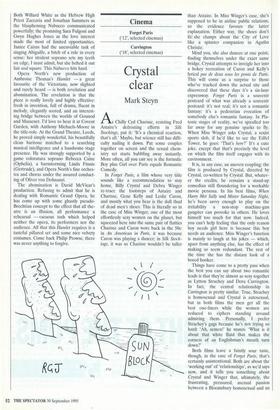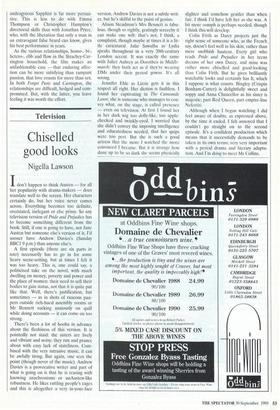Cinema
Forget Paris (`12', selected cinemas) Carrington (`18', selected cinemas)
Crystal clear
Mark Steyn
AChilly Cyd Charisse, resisting Fred Astaire's defrosting efforts in Silk Stockings, put it: 'It's a chemical reaction, that's all.' Maybe, but science still has diffi- culty nailing it down. Put some couples together on screen and the sexual chem- istry set starts bubbling away instantly. More often, all you can see is the formula: Boy plus Girl over Paris equals Romantic Comedy.
In Forget Paris, a film whose very title sounds like a recommendation to stay home, Billy Crystal and Debra Winger re-trace the footsteps of Astaire and Charisse, Gene Kelly and Leslie Caron, and mostly what you hear is the dull thud of dead men's shoes. This is literally so in the case of Miss Winger, one of the most effortlessly sexy women on the planet, but squeezed here into the same pair of flatties Charisse and Caron wore back in the 50s: in An American in Paris, it was because Caron was playing a dancer; in Silk Stock- ings, it was so Charisse wouldn't be taller than Astaire. In Miss Winger's case, she's supposed to be in airline public relations, so the evidence favours the latter explanation. Either way, the shoes don't fit: she clumps about the City of Love like a spinster companion in Agatha Christie.
Mind you, she also dances: at one point, finding themselves under the exact same bridge, Crystal attempts to inveigle her into a hokey recreation of Caron and Kelly's lyrical pas de deux sous les ponts de Paris. This will come as a surprise to those who've tracked down the actual site and discovered that these days it's a six-lane expressway. Forget Paris is a souvenir postcard of what was already a souvenir postcard: it's not real; it's not a romantic fantasy; it's a pedestrian evocation of somebody else's romantic fantasy. In Pla- tonic stages of reality, we've spiralled too far away for any genuine sparks to fly. When Miss Winger asks Crystal, a sexist sports slob, if he'd like to see the Eiffel Tower, he goes: 'That's here?' It's a cute joke, except that that's precisely the level on which the film itself engages with its environment.
It is, in any case, an uneven coupling: the film is produced by Crystal, directed by Crystal, co-written by Crystal. But, whatev- er the credits, he remains a stand-up comedian still floundering for a workable movie persona. In his best films, When Harry Met Sally and Mister Saturday Night, he's been savvy enough to play on the irritability a non-stop machine-gun gangster can provoke in others. He loves himself too much for that now. Indeed, you can't help feeling that the only reason boy needs girl here is because this boy needs an audience. Miss Winger's function is mainly to laugh at his jokes — which, apart from anything else, has the effect of making us seem redundant. The rest of the time she has the distant look of a bored hooker.
Things have come to a pretty pass when the best you can say about two romantic leads is that they're almost as sexy together as Lytton Strachey and Dora Carrington. In fact, the central relationship in Carrington is pretty similar. True, Strachey is homosexual and Crystal is autosexual, but in both films the men get all the best one-liners while the women are reduced to ciphers standing around admiring them. Personally, I prefer Strachey's gags because he's not trying so hard: `Ah, semen!' he muses. 'What is it about that white fluid that makes the corners of an Englishman's mouth turn down?'
Both films leave a faintly sour taste, though, in the case of Forget Paris, that's certainly unintentional. Both are about the `working out' of 'relationships', as we'd says now, and it tells you something about Crystal and Winger that, ultimately, the frustrating, pressured, asexual passion between a Bloomsbury homosexual and an androgynous Sapphist is far more persua- sive. This is less to do with Emma Thompson or Christopher Hampton's directorial skills than with Jonathan Pryce, who, with the liberation that only a man in an extravagant false beard can know, gives his best performance in years.
As the various relationships, homo-, bi-, hetero-, ebb and flow in the Strachey-Car- rington household, the film makes an unfashionable case — that enduring affec- tion can be more satisfying than rampant passion, that love counts for more than sex. In both Forget Paris and Carrington, the relationships are difficult, hedged and com- promised. But, with the latter, you leave feeling it was worth the effort.



































































 Previous page
Previous page